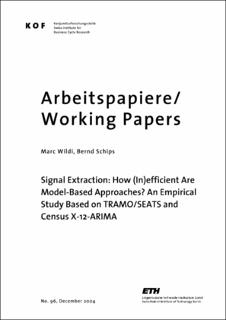Please use this identifier to cite or link to this item:
https://doi.org/10.21256/zhaw-3308Full metadata record
| DC Field | Value | Language |
|---|---|---|
| dc.contributor.author | Wildi, Marc | - |
| dc.contributor.author | Schips, Bernd | - |
| dc.date.accessioned | 2019-04-24T12:15:30Z | - |
| dc.date.available | 2019-04-24T12:15:30Z | - |
| dc.date.issued | 2004 | - |
| dc.identifier.uri | https://digitalcollection.zhaw.ch/handle/11475/16839 | - |
| dc.description | Lizenz: http://rightsstatements.org/page/InC-NC/1.0/ | de_CH |
| dc.description.abstract | Estimation of signals at the current boundary of time series is an important task in many practical applications. In order to apply the symmetric filter at current time, model-based approaches typically rely on forecasts generated from a time series model in order to extend (stretch) the time series into the future. In this paper we analyze performances of concurrent filters based on TRAMO and X-12-ARIMA for business survey data and compare the results to a new efficient estimation method which does not rely on forecasts. It is shown that both model-based procedures are subject to heavy model misspecification related to false unit root identification at frequency zero and at seasonal frequencies. Our results strongly suggest that the traditional modelbased approach should not be used for problems involving multi-step ahead forecasts such as e.g. the determination of concurrent filters. | de_CH |
| dc.format.extent | 26 | de_CH |
| dc.language.iso | en | de_CH |
| dc.publisher | ETH Zurich | de_CH |
| dc.relation.ispartofseries | KOF Working Papers | de_CH |
| dc.rights | Licence according to publishing contract | de_CH |
| dc.subject | Signalextraction | de_CH |
| dc.subject | Concurrent filter | de_CH |
| dc.subject | Unit root | de_CH |
| dc.subject | Amplitude and time delay | de_CH |
| dc.subject.ddc | 500: Naturwissenschaften | de_CH |
| dc.title | Signal extraction: how (in)efficient are model-based approaches? : an empirical study based on TRAMO/SEATS and census X-12-ARIMA | de_CH |
| dc.type | Working Paper – Gutachten – Studie | de_CH |
| dcterms.type | Text | de_CH |
| zhaw.departement | School of Engineering | de_CH |
| zhaw.organisationalunit | Institut für Datenanalyse und Prozessdesign (IDP) | de_CH |
| zhaw.publisher.place | Zurich | de_CH |
| dc.identifier.doi | 10.21256/zhaw-3308 | - |
| dc.identifier.doi | 10.3929/ethz-a-004957347 | de_CH |
| zhaw.funding.eu | No | de_CH |
| zhaw.originated.zhaw | Yes | de_CH |
| zhaw.series.number | 96 | de_CH |
| Appears in collections: | Publikationen School of Engineering | |
Files in This Item:
| File | Description | Size | Format | |
|---|---|---|---|---|
| 2004_Wildi_Signal_extraction_KOF_Working_Papers_96.pdf | 260.98 kB | Adobe PDF |  View/Open |
Show simple item record
Wildi, M., & Schips, B. (2004). Signal extraction: how (in)efficient are model-based approaches? : an empirical study based on TRAMO/SEATS and census X-12-ARIMA. ETH Zurich. https://doi.org/10.21256/zhaw-3308
Wildi, M. and Schips, B. (2004) Signal extraction: how (in)efficient are model-based approaches? : an empirical study based on TRAMO/SEATS and census X-12-ARIMA. Zurich: ETH Zurich. Available at: https://doi.org/10.21256/zhaw-3308.
M. Wildi and B. Schips, “Signal extraction: how (in)efficient are model-based approaches? : an empirical study based on TRAMO/SEATS and census X-12-ARIMA,” ETH Zurich, Zurich, 2004. doi: 10.21256/zhaw-3308.
WILDI, Marc und Bernd SCHIPS, 2004. Signal extraction: how (in)efficient are model-based approaches? : an empirical study based on TRAMO/SEATS and census X-12-ARIMA. Zurich: ETH Zurich
Wildi, Marc, and Bernd Schips. 2004. “Signal Extraction: How (in)Efficient Are Model-Based Approaches? : An Empirical Study Based on TRAMO/SEATS and Census X-12-ARIMA.” Zurich: ETH Zurich. https://doi.org/10.21256/zhaw-3308.
Wildi, Marc, and Bernd Schips. Signal Extraction: How (in)Efficient Are Model-Based Approaches? : An Empirical Study Based on TRAMO/SEATS and Census X-12-ARIMA. ETH Zurich, 2004, https://doi.org/10.21256/zhaw-3308.
Items in DSpace are protected by copyright, with all rights reserved, unless otherwise indicated.